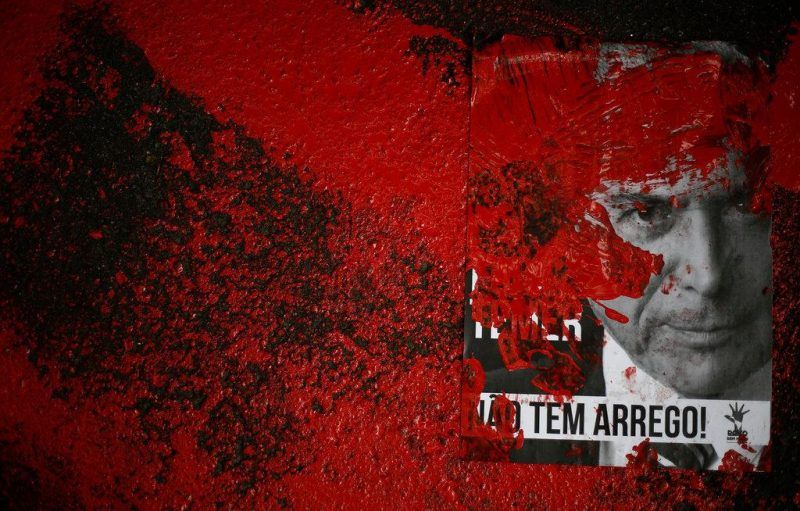
Brazil, a nation rich in natural resources, fertile lands and cultural diversity, has struggled for decades with underdevelopment. Some blame it on the “custo Brasil,” or “Brazil cost” — the accumulated price, in cash, time and other resources, of doing business here — pointing to the weight of bureaucracy, high taxes and poor investment. Others cite insufficient investments in infrastructure, science, technology and education.
The root cause of our struggle, however, is a decay of democracy in the face of systemic, institutional corruption. Our representative system has been so far removed from its raison d’être that the will to govern has been replaced by the goal of remaining in power.
Nothing better illustrates the complex web of Brazil’s democratic decay than operation Car Wash, the wide-ranging investigation into corruption.
Our governmental structure is coalition-based, which makes it vulnerable to corruption. With dozens of parties vying to form a majority in Congress, elections are bloated and prohibitively expensive. Gaining power allows a political party the chance to appoint executives at state-run companies. Executives receive kickbacks from contractors, and some of that cash is funneled back to the party.
It is a self-perpetuating cycle: Fraudulent elections generate public administrations that promote corruption, and are operated by politicians who create electoral reforms to grant themselves more and more power, resources and control. As a result, Brazil’s main political parties, which have taken uninterrupted turns in authority for decades, are focused not on governing the country, but on building alliances to stay in power.
Ministers, advisers, senators, representatives and even members of the judicial branch collaborate with private interests to make decisions about public investments and push for the approval of bills that disproportionately benefit those in power.
Some of Brazil’s largest economic groups are, in fact, artificial empires built on tax exemptions and loans from the Brazilian Development Bank, and their failures have shaken the foundations of the country’s economy.
Development resources intended to improve quality of life and reduce social inequality have been drained to enrich certain groups and companies that have been hailed as “national champions,” and to finance the political party system. Through misguided economic policy and the misappropriation of public resources, they have cost more than 14 million people their jobs.
Even President Michel Temer, whose agenda eschews the public interest and puts our natural resources at risk, was recently charged with bribery and is actively trying to thwart potential investigations into his operations. At the end of August he tried to abolish 11 million acres of a preserve in the Amazon — about the size of Denmark — so the land could be opened to mining. This will further encourage deforestation, the loss of water resources and violence against local communities and indigenous peoples.
But operation Car Wash has shown that we can punish politicians and executives for their crimes. The investigation has been integral in exposing the corruption that permeates our country, revealing billions of dollars in illegal payments, jailing executives and bringing a sitting president into court on charges of violating campaign finance laws. It has inaugurated an era in which corrupt businessmen and politicians will fear justice because they know that imprisonment may indeed be in their future. The operation gives us a glimpse of a possible political future for the country — one that is less conformist, has a high regard for the values of citizenship and demands equality for all.
Operation Car Wash also serves as a warning for the business sector and its deep-rooted practice of influencing government decisions. Businesses engaged in corruption can now be dealt with by the justice system, which will free us up to create an environment in which competition can promote efficiency and adequate public works and services.
This tsunami sweeping Brazil will allow space for a new political paradigm founded on the principle that justice means justice for all. We’re not there yet, but operation Car Wash is working, as evidenced by the reaction of the political establishment along the entire ideological spectrum.
A significant number of political, party and business leaders are using all their assets to keep things as they are. There are alliances between former opponents aimed at stopping the investigation, and there are attempts to impose rules for the 2018 general election that would guarantee continuity for those currently in power. Operation Car Wash’s main task force was even shut down in July, leaving the investigation to be absorbed by a larger anti-corruption division with a more limited scope.
Our hope of seeing Brazil rejuvenated remains in the hands of the press, the judicial branch and the people. With a lot of pain, we are learning how to create effective laws and institutions. The first big test will be the 2018 elections, when voters will be able to conduct the biggest “wash” ever seen in Brazilian politics — when they will have a chance to clean out corruption and open the door to a reconstruction of the country’s institutions.
Marina Silva is a teacher, environmentalist and former senator. She was Brazil’s minister of the environment from 2003 to 2008, and ran for president in 2010 and 2014.
